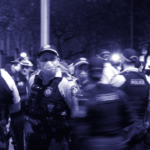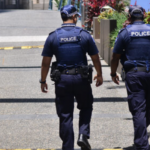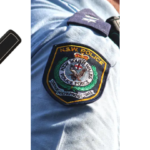Queensland Empowers Police to Conduct Random Searches on Members of the Public

“Every week in parliament is significant but this one is particularly special”, Queensland premier David Crisafulli told the public, and the reason why this particular week tickles his fancy is that on Wednesday, 11 June 2025 laws were passed that allow Queensland Police Service officers to stop and search anyone out in public anywhere using a scanner without holding any reasonable suspicion for a search.
“This week we get to extend and make permanent Jack’s Law,” the reactionary leader of the state Liberal National government explained to reporters. “Jack’s Law is about giving the police the ability to wand and take knives off the streets. It is about stronger laws to protect Queenslanders.”
But what Crisafulli fails to note is that with the passing of the Police Powers and Responsibilities (Making Jack’s Law Permanent) and Other Legislation Amendment Bill 2025 through the one house of Queensland parliament on 11 June, is that the most basic right of all Queenslanders to go about their daily business without being randomly approached by law enforcement has been extinguished.
Reasonable suspicion is a legal standard that requires law enforcement officers to have a well-founded belief that a civilian has, is or is on their way to committing a criminal offence. Holding a reasonable suspicion means an officer must be able to articulate what their reasonable suspicion is, and most importantly, it guards against personal prejudices being used as a reason to target people.
The “particularly special” reforms are being progressed on the back of research showing that random, free-for-all searching of the public doesn’t result in reduced levels of violent crime, which would underscore that Crisafulli is turning Queensland into a rights-depleted police state because authoritarianism is trending globally at present.
The erosion of reasonable suspicion
The law that the Crisafulli government has made permanent and all-pervasive throughout the state of Queensland is known as Jack’s Law. The law allows police officers to run a scanner, also described as a handheld metal detector or wand, over the outer clothing of civilians in public to ensure that people randomly searched are not holding a concealed weapon, and in particular, a knife, in public.
The initial trialling of this law followed the tragic stabbing of teenager Jack Beasley on the Gold Coast in 2019.
In April 2021, laws were passed to facilitate the trialling of the random searching of civilians using handheld metal detecting wands in two Gold Coast safe night precincts, which are zones created in late-night entertainment areas, where enhanced policing in order to reduce violent crime occurs.
The Palaszczuk government then passed further legislation in March 2023, that extended the trial to April 2025 and increased its scope to cover 15 safe night precincts across the state, along with all public transport stations. This was based upon “record levels of unlawful knife possession”, as over the year 2021-22, 542 persons were charged with illegally possessing a knife across all 15 SNPs.
An extra safeguard was added to the regime at this point, which required a senior police officer to sign off on a scanning operation, which had to be in a place where at least one knife crime, serious violent offence or more than one concealed weapon offence had occurred in the last six months, and such authorisation facilitated a 12 hour period for wanding operations to occur.
One of Queensland Labor’s last acts in office was to expand the use of wanding last August, so that it included public places, like shopping centres, retail premises, sporting and entertainment venues, licensed venues and the trial was extended to October 2026. In terms of retail areas, the stipulation was a store be open after midnight, or two knife crimes had occurred in the area within six months.
The law passed on Wednesday removed the requirement to seek the authority of senior police in a “relevant place”, which is an SNP or public transport station, while in all other public places, scanning can occur once the greenlight from a senior police officer is provided, and a requirement to notify the manager or occupier of a premises that wanding is occurring has been removed.
Flawed pretext for removing legal safeguard
Griffith University Professor Janet Ransley was a co-author of a government-commissioned August 2022 report into the first 12 months of trialling random wanding operations in Gold Coast SNPs. The report provided nine key findings, which included no evidence of a deterrent effect, no evidence of a reduction in other crime, including violent crime, and there was increased detection of illicit drugs.
“We found no evidence that increased detection of knives reduces violent crime. And the reason for that is it is very easy to replace weapons, with other knifes, with other kinds of weapons or even with fists and feet,” Professor Ransley told ABC PM on Wednesday. She added that this is what research in Victoria and in the United Kingdom has also found.
“We found a small number of police mention some concerning stereotypes, particularly racial stereotypes, as being the types of indicators that they took into account when deciding who to target to wand,” the academic further warned.
This is the most dangerous aspect in regard to making the entire jurisdiction of Queensland a random wanding zone, which is that Queensland police, indeed, Australian police in general, are well known to target particular people in their operations even when reasonable suspicion is required.
In Australia, First Nations people, people of colour, queer people, trans people and young people are used to overpolicing when a reasonable suspicion to search is required.
But now the guardrail of reasonable suspicion has been removed in Queensland, all civilians are fair game for the approach of a police officer if they don’t like the look of them – it’s that simple.
Wanding the entire continent
The Minns government in NSW passed wanding laws in June last year, in the wake of the Bondi Junction mass stabbing incident and the nonlethal stabbing of two priests in a Wakely church in April last year. It was noted these laws were modelled on the Queensland wanding regime, and the local laws see senior police establishing “designated areas” in a range of public places.
The NSW laws are permanent, and a statutory review of them is required after 3 years of operation.
South Australia passed its own wanding laws in March. These were again based on the Queensland and NSW laws. While that same month, Victoria expanded its existing designated area laws, which were established in 2009 and permit both wanding and pat down searches devoid of any reasonable suspicion. So, now the 12 hour period restriction on wanding has been extended to 24 hours.
The Allan government in Victoria passed its designated area wanding law reforms, along with a prohibition on machetes, again in a crackdown on knife crime.
At the time of the Victorian reforms, Liberty Victoria released police figures, revealing that over the 24 months to January 2023, 23,718 searches were carried out in 61 designated areas, with 18,906 involving a wand and 4,812 being pat downs. But of the 23,718 random searches, only 252 turned up an object or a substance, and that accounts for a 1 percent success rate.
In Queensland, the figures reveal that QPS officers conducted 116,000 random scans of civilians between April 2023 and June this year, which resulted in 1,100 people being detected with a knife or another type of weapon on them.
Again, this is a success rate of just 1 percent, however Queensland acting assistant police commissioner Rhys Wildman told the ABC that these figures are a “huge concern”.
So, the pattern that appears to be playing out in Australia is that the random scanning of people with a metal detector by police, who are free to pick and choose their targets based on their own prejudices and without holding any reasonable suspicion, are likely to be enacted countrywide.
And thanks to Crisafulli, these laws might eventually be applied to anyone anywhere in public right across the continent.







